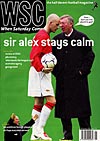 The future of a genuine players' union is in doubt, despite the position of its most influential supporter, national coach Javier Aguirre. Simeon Tegel reports
The future of a genuine players' union is in doubt, despite the position of its most influential supporter, national coach Javier Aguirre. Simeon Tegel reports
Mexico needs its own Jimmy Hill. No, not the sort of pundit fans love to hate. The airwaves here are already heavy with those. Instead, I mean a figure who can lead professionals out of the feudal age of labour relations imposed by the clubs and football authorities, just as Hill did for English players in the early 1960s when as chairman of the PFA he successfully campaigned to end the maximum wage and retain-and-transfer system.
Despite pressure from FIFA, the Mexican Football Federation (FMF by its Spanish initials) remains hunkered down in the dark ages, refusing to recognise the attempts of the toothless Football Professionals’ Association to transform itself into a strong, modern union. In a typical recent incident, AFP president José María Huerta suffered the indignity of being kicked off the training pitch of Guadalajara team Tecos by the club’s vice-president Dionisio Fernández. The balance of power in the game’s industrial relations was eloquently illustrated, if that is the right way to phrase it, by Fernández shouting what in English would euphemistically be referred to as “Anglo-Saxon” at Huerta in front of a startled press pack.
In case the point was still not clear, Tecos president Juan José Leaño later warned his players they would be sacked instantly if they joined the union, adding that Huerta was a “terrorist” intent on sowing fear. Asked for his opinion, an intimidated Tecos captain Gilberto Adame would only venture: “I cannot talk about it because I am concentrating on the football.”
Outside the club gates, Huerta speculated that Fernández’s obscenities proved the nervousness owners had of more evenly balanced relations between players and their clubs. “There are ways to treat people and the proof of that is the way footballers have been dealt with for decades by people without scruples,” he said.
Meanwhile, the FMF proposed an alternative to Huerta’s union – its own Footballers’ Commission. Even though the federation reserved the right to veto the appointment of any elected leader it didn’t like, as well as denying the commission the right to strike, most players voted to accept the initiative, at least according to the FMF.
Apart from Fernández’s uncouth outburst, there are plenty of other reasons why players here need the support of a union. The notorious “leg market” is just the most obvious. Every June, in a hotel in Acapulco, hundreds of players wait anxiously in the foyer while 20 storeys above them directors hammer out transfer details. The footballers are told of the deals after they have been struck. Wages are sometimes cut, while players may have to uproot their families and move to a new club more than 1,000 miles from their previous home. And those are the lucky ones. Mexico is still living in the pre-Bosman age. Players who reject such contracts face remaining in limbo with their existing club and, potentially, an early end to their careers.
In one infamous case, Mexican international Cesareo Victorino was sold against his will by Pachuca, in central Mexico, to Monterrey near the US border, some 700 miles away. After predictably failing to settle, the midfielder was the subject of a Monterrey medical that alleged he had a bad back and could no longer play. The £2 million transfer fee was not paid. Nevertheless, Victorino was back on the pitch for Pachuca within weeks, scoring the goal that put Monterrey out of the final knockout stages of Mexico’s Summer championship in 2000 .
The irony is that all this should be happening at a time when Javier Aguirre, the founding president of the Football Professionals’ Association, is experiencing a purple patch as national team manager. Having taken over this summer, the widely respected Aguirre achieved four wins in his last five games to rescue Mexico’s ticket to the Far East next summer.
A former hard-running midfielder with 86 caps, and a Zapatista sympathiser, Aguirre is all but un-sackable at the moment. What could a few strong words from him in support of Huerta’s organisation achieve?
From WSC 179 January 2002. What was happening this month